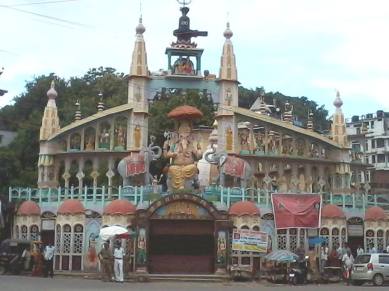Guwahati declares ‘silent zone’ around all religious places
The notification states that it was issued in “compliance of the direction received from the Government of Assam”.

THE DISTRICT Magistrate of Kamrup (Metro) district, which includes Guwahati city and its suburbs, has declared a radius of 100 metres from “all prominent religious places” under his jurisdiction — including temples, mosques, gurudwaras and churches — as a “silent zone”. According to a notification issued Friday evening, DM M Angamuthu has also asked the State Pollution Control Board to submit a monthly report on noise pollution in these zones.
The notification states that it was issued in “compliance of the direction received from the Government of Assam”. It states that the decision was taken under Rule 3 (2) of the Noise Pollution (Regulation and Control) Rules, 2000, of the Environment Protection Act of 1986. The notification, however, does not directly refer to the use of microphones and loudspeakers in places of worship.
monthly limit of free stories.
with an Express account.
When contacted by The Sunday Express, Angamuthu declined to comment on the contents of the notification. “Anyway, the use of loudspeakers is not permitted between 10 pm and 6 am,” he said. Officials from the BJP-led government in Assam were not available for comment. Rule 3 of the Noise Pollution (Regulation and Control) Rules, 2000, of the Environment Protection Act of 1986, deals with “ambient air quality standards in respect of noise for different areas/zones”.
Rule 3 (2) states that the “State Government may categorise the areas into industrial, commercial, residential or silence areas/zones for the purpose of implementation of noise standards for different areas”. According to the notification, the five areas marked as silent zones in Guwahati include all government and private hospitals; educational institutions; the high court, district and sessions court and the CJM’s court; all government offices; and, “all prominent religious places inclusive of temples, gurudwaras, mosques, churches, monastery, math and naam-ghar, etc”.
The notification states that officials of the Public Works Department have been asked to place proper signages in the notified areas within 15 days. The State Pollution Control Board has been asked to collect, compile and publish technical and statistical data relating to noise pollution as well as measures taken for its effective prevention and control, it says. The issue of loudspeakers being used at places of worship was the subject of a heated debate on social media recently after singer Sonu Nigam wrote that he had been woken by the azaan and questioned the use of loudspeakers at places of worship.
On April 16, Nigam posted on his official Twitter account: “God bless everyone. I’m not a Muslim and I have to be woken up by the Azaan in the morning. When will this forced religiousness end in India.” In another tweet, he wrote: “I don’t believe in any temple or gurudwara using electricity to wake up people who don’t follow the religion. Why then..? Honest? True?”